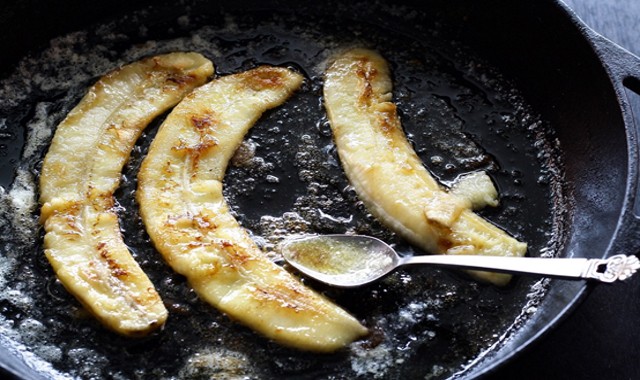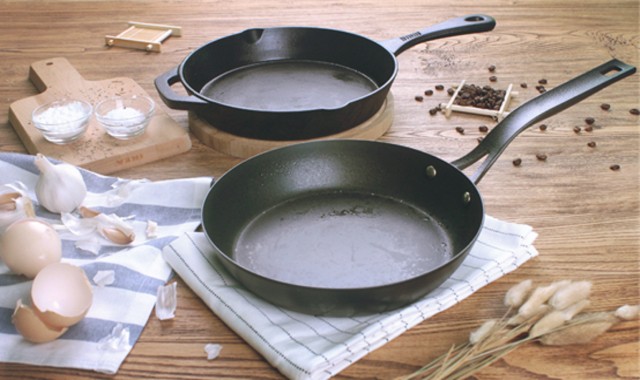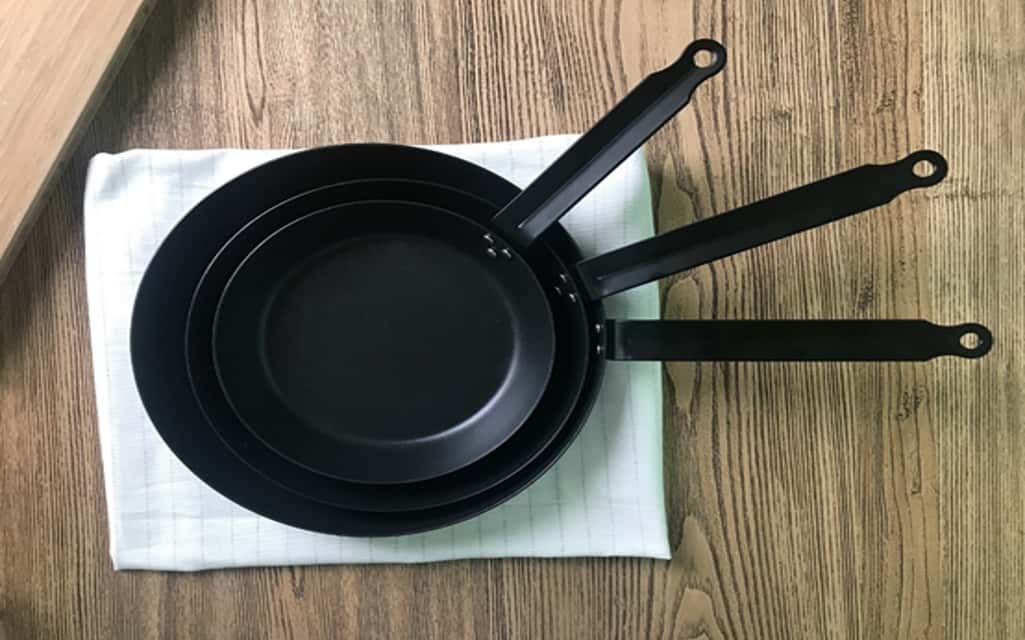Read This First, Thank Me Later
My mother had a favorite pan for most of her dishes: a pot that was left to her by my grandma more than a generation ago. Even now, while writing this piece, I am cooking the food on the stove with the same pan. Luckily for me, I don’t need to worry about burning my dinner and can enjoy typing on my computer while drinking my glass of Merlot. The reason? Cast iron pans are well-known for not sticking food.
You might also have a favorite pan for your every-day cooking. I hope that you are using a cast iron pan since its pros highly outweigh its cons. If you are not that familiar with cast iron cookware yet, let me introduce you to this kitchen superhero and 12 reasons for why this is what your food (and your family) is looking for:
1. Cast iron has been used since the Iron Age – And that’s for more than a reason
You can go back to your grandma’s recipes to realize that often the most delicious dishes are also the simplest ones. That same principle can be applied to your cookware. Cast iron is basically iron which has been melted and placed in a mold. There must be more than one good reason if we have kept using this material for over 2500 years.
2. Cast iron cookware can be a great iron supplement to your diet
Anemia caused by iron deficiency affects 1.6 billion people in the world and 5 million people in the US (the sum of people living in Los Angeles and Paris). This nutritional imbalance is known to be linked to Alzheimer’s, heart disease, colorectal cancer, and other conditions. Vegetarians and women are more at risk of suffering from iron deficiency, a disease listed among the top health risks by the Global Burden of Disease (GBD). An average woman will spend almost ten years of her life menstruating. All that blood contains a significant amount of iron that is leaving your body. That is why it is essential especially for young women to reintegrate their daily amount of iron through their diet or their cooking habits (thank you, cast iron).
3. Cast iron pans give relatively fewer health risks than non-sticky pans
Just have a look at your Teflon non-sticky pans. If you see any scratch on that (which is very common even with your greatest care), you might be causing great harms to your body with each meal you cook. This is because Teflon pans can produce PTFE-fumes if used improperly or transfer PFOA (perfluorooctanoic acid) to your food. While for cast iron pans, their weakness is that they can be quite heavy, but we can forgive this to them considering all the other benefits.
4. Professional chefs love cast iron pans
Cast iron might bring you back to memories of your grandma, but professional chefs can tell you that she knew what she was talking about. Contrary to what you think, cast iron pans can be really versatile. You can sauté, sear, roast and braise meat, deep fry potatoes and even bake cakes with them.
Tip: avoid using them for cooking acidic food (like lemon or tomato sauce), since the resulting chemical reaction might release more iron than with other food.
5. They’re almost indestructible
They are often made of a single piece, ears and handles included. You can forget about mold and about breaking your cast iron pan. You have to call Ironman to destroy it, or otherwise you will almost inevitably fail. You can jump on cast iron pans, throw them at something, burn them, and they will still be there for you. See, that’s what is called a valuable ally in the kitchen.
6. Stove and oven – Oven and stove
You wanted to try a new dish and started cooking the food on the stove while reading the recipe. Right at the end of the recipe, you discover that you need to place the food also in the oven. You will have to risk hurting yourself and do army maneuvers to load the food into a more oven-friendly recipient. With cast iron cookware, this is not a problem anymore. Wear your magic gloves and move the pan from the stove to the oven or vice versa. You can do it in a blink of an eye and enjoy your fancy food.
Tip: use a metal turner to move food on the pan.

7. CIO – Cook It Once (and keep the heat for long)
Who doesn’t like to eat freshly made and hot food? Some dishes lose their true delicious taste when they become cold. And if you are trying to cook for someone, you don’t want the food to get spoiled while serving it. Cast iron cookware is made of a porous material, so when you heat it up, it can maintain the heat for more extended periods of time. The food will keep cooking itself even when you switch off the stove.
8. Lazy-people-approved: so easy to clean!
Cast iron cookware vs. water is the same as cats vs. dogs. You can’t put them together, at least not for a long time. You can definitively cook food that has sauces or liquids, what I’m talking about here is to not leave your pan in the sink for a week. Avoid using soap or steel wool, as these may strip the pan’s seasoning. To remove stuck-on food, scrub the pan with a paste of coarse kosher salt and water. Then rinse or wipe with a paper towel.
Tip: no microwave or dishwasher for your cast iron pan.
9. The “Prince Charming Pan” for your food
It’s great to spend a good proportion of your well-earned salary to buy organic and healthy food. But if the pan you use is not good enough, all the efforts and the nutritional benefits will be wasted. As we’ve just seen together, your diet can benefit from using a cast iron pan. There are many different types of cast iron cookware, but you need maximum 5 of them for most of your dishes. The most popular model is a cast iron skillet.
Tip: 10” one is lighter but with a 12” one you can feed a bigger family.
10. They’re like Karma: treat them well, and they will pay you back
There is a reason for why iron cast pans hate water: they can easily rust. The best way to prevent rust and to avoid food sticking on it is to “season” your pan. Seasoning means that you should oxidize oil on purpose on your iron cast pan. You can do that by spreading vegetable oil on your pan, placing it in the oven for 375° F for 1 hour. This process can produce strong smells, so you should do that outside or open your kitchen windows. If you have to wash it with soap, remember to re-season it afterward. It’s more convenient to buy a pre-seasoned cast iron pan. You will get all the benefits of the pan with half of the efforts.
Tip: do not shock this type of cookware with cold water while it’s still hot since this will impact its seasoning.
11. The Little John for your Robin Food
Whether you are an experienced or a beginner cook, there’s still a great sense of pleasure when your family or hosts compliment you for the food. With a cast iron pan, every time you use it, there will be a layer of oil added to its seasoning. That same characteristic will increase the flavor of your dishes and at the same time allow you to use less fat and oils. Besides, you can stop worrying about burning your food (but still pay attention to that), since cast iron is known to be non-sticky as well as being able to head food quite evenly.

12. Environmoney-friendly
You save money, you save the planet by reducing waste. Luckily for us, cast iron cookware can be much cheaper than other types of pans and can last for much longer. That means that you would save more by using a cast iron pan for many years than by buying multiple non-sticky pans. Not to mention that pans can contribute a lot to the pollution of our planet. That’s especially true if they are made of such bad quality that you need to change them more often than you do with your haircut.
What are you waiting for? The main downside to owning a cast iron pan: cooking on it can become addictive. Cast iron pans are reliable, durable, versatile, and less polluting. If you want to get one, I can recommend from my personal experience the Velosan pans. They come pre-seasoned with a fully-natural fat film to protect your food from burning and your health from any risks. I feel I can trust them, their products meet the EU standards and have a CE label. I love the pan I got from them, not only because of its quality but also because it can really last a long time. They have different types of pans to meet most of our needs and their names sound as protecting as their products.



